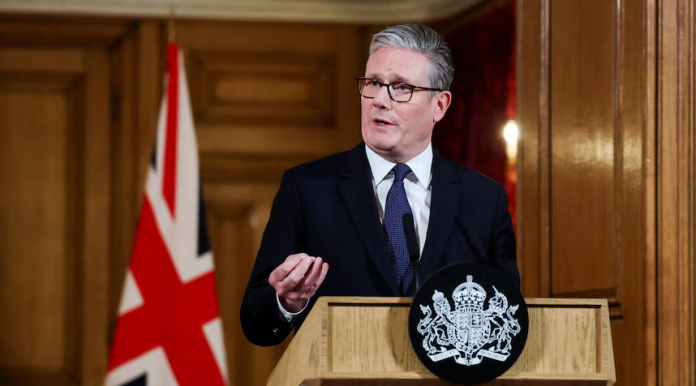In a landmark diplomatic development, France and the United Kingdom have reportedly agreed to recognize the State of Palestine by September this year. The joint move by two of Europe’s most influential powers signals a tectonic shift in the region’s political landscape, potentially opening the floodgates for similar recognition by other European Union member states.
Sources familiar with the matter suggest that the decision was pre-planned and finalized during a recent high-level meeting between British Prime Minister and former U.S. President Donald Trump, who continues to exert significant influence in transatlantic policy circles. This strategic move appears to be tied to the evolving situation in Gaza, which is now almost entirely under Israeli control, with Hamas said to be effectively eliminated.
The recognition comes at a time when the humanitarian cost in Gaza has drawn widespread global criticism. Over the past months, Gaza has faced intense Israeli military operations aimed at dismantling Hamas’s militant infrastructure. While Israel claims success in neutralizing the threat, the toll on civilian life has been catastrophic, with tens of thousands of innocent Palestinians killed or displaced.
Many observers view this joint recognition as a calculated post-conflict step—one that Europe withheld until Israel had achieved its military objectives. With Hamas largely dismantled, Western governments now see little strategic risk in granting Palestine statehood recognition. The underlying logic appears to be: the threat is neutralized, and formalizing Palestinian statehood may serve as a stabilizing factor.
France and the UK have long advocated for a two-state solution in principle, but had held off on formal recognition, citing concerns over Palestinian governance, Israeli security, and regional stability. Now, with the military equation significantly altered in Israel’s favor and the geopolitical landscape shifting, the calculus appears to have changed.
European diplomats argue that recognition could be the first step toward rebuilding Palestinian institutions and jumpstarting economic development. The recognition will open doors for Palestine to engage in bilateral trade, seek international loans and investments, and establish diplomatic and commercial ties with a broader range of countries. It is anticipated that this could usher in a new era of growth and reconstruction, especially in the battered Gaza Strip.
Interestingly, even many Palestinians are expected to welcome this development, despite its controversial timing. For years, Palestinian leaders and civil society have pushed for recognition as a sovereign state, and many may view this moment as a hard-earned diplomatic victory—albeit at a devastating cost. The recognition from two global powers could breathe new life into the long-stalled dream of an independent Palestinian state.
While some Palestinian factions may criticize the move as too little too late, or as legitimizing the destruction of Gaza, others see it as an opportunity to pivot toward state-building and international legitimacy. The Palestinian Authority, in particular, is expected to leverage this development to consolidate its governance over both the West Bank and Gaza, provided international donors support such a transition.
Following the UK and France’s lead, it is likely that other European nations—particularly Spain, Ireland, Belgium, and Norway—may move to recognize Palestine as well. Already, several of these countries have shown sympathy toward Palestinian aspirations and frustration with Israel’s handling of the Gaza situation.
If a critical mass of EU countries follow suit, it could prompt the European Union to adopt a formal bloc-wide recognition of Palestine, significantly bolstering its international status. Such a move would have implications far beyond Europe, potentially influencing the stance of other Western allies and institutions like the UN and IMF.
With international recognition comes new responsibilities—and opportunities. A recognized State of Palestine could begin signing trade agreements, joining international organizations, and establishing embassies. Global companies and humanitarian organizations might find it easier to operate in Palestinian territories, thus aiding reconstruction and economic development.
This period may also see significant foreign investment, particularly from Gulf nations. Countries like Qatar, the UAE, and especially Saudi Arabia may pour resources into rebuilding Gaza and supporting new infrastructure projects in the West Bank.
Interestingly, the recognition of Palestine may also unlock a new phase of diplomacy regarding Israel. Reports suggest that once Palestine achieves widespread recognition, efforts may be renewed to normalize ties between Israel and more Muslim-majority nations. Saudi Arabia is expected to lead this initiative, while Pakistan—long a vocal supporter of Palestinian rights—may also reconsider its stance.
Pakistan has historically linked its recognition of Israel to the establishment of an independent Palestinian state. With that condition potentially met, Islamabad may find it diplomatically feasible to explore formal relations with Tel Aviv, albeit cautiously. Such a shift would mark a dramatic evolution in Pakistan’s foreign policy and could reshape regional alliances.
While the recognition of Palestine by France and the UK is being hailed by some as a positive and overdue step, it is impossible to ignore the tragic cost that has preceded it. The massive loss of life in Gaza, particularly among civilians, casts a long shadow over what should have been a diplomatic milestone.
Many critics argue that this recognition could have—and should have—been achieved without the devastation. The current move, they say, appears more like a post-conflict endorsement of Israeli objectives than a genuine stand for Palestinian self-determination.
Still, if managed wisely, this recognition could mark the beginning of a new chapter for the Middle East—one in which both Palestinians and Israelis are afforded dignity, security, and the chance to thrive. As more nations prepare to follow France and the UK, the world will be watching to see whether this diplomatic breakthrough leads to genuine peace—or simply another pause in a seemingly endless cycle of conflict.
The recognition of Palestine is not just a political statement—it is a moral and humanitarian acknowledgment that a people long denied sovereignty deserve a state of their own. The next steps—reconstruction, reconciliation, and regional diplomacy—will determine whether this historic moment becomes a foundation for peace or just another headline in a troubled history.

















